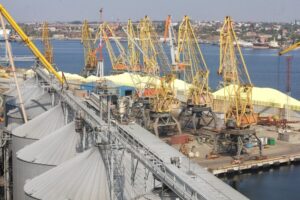
“Kernel, one of Ukraine’s largest agricultural holdings, has been using its Aeneid and Mavka vessels to export agricultural products for the second year in a row and intends to further expand its fleet, the agricultural holding reported on Facebook.
“For the second year, we have been operating our own vessels and transporting Ukrainian products in the difficult conditions of the termination of the grain deal. (…) Two Kernel vessels, Aeneid and Mavka, are currently exporting Ukrainian products. The deadweight (maximum loading) of the bulk carrier Aeneid is 47,335 tons, and the Mavka tanker is 13,500 tons. We have no plans to stop and are already working on expanding the fleet,” the statement said.
The agricultural holding noted that the use of its own fleet is economically beneficial, especially during the period of inflated freight rates during martial law. The development of its own shipping gives impetus to the entire market and strengthens the country’s export capabilities, Kernel believes.
“The Black Sea remains the only alternative for Ukrainian exports. The deep-water ports are able to accumulate and ship large-tonnage consignments of more than 60 thousand tons. This makes it possible to optimize logistics processes and significantly reduce costs. All alternative routes have extremely high logistics costs,” the agricultural holding explained and promised to continue to strengthen Ukraine’s exports and contribute to food stability in Europe and the world.
As reported, before the war, Kernel was the world’s largest producer of sunflower oil (about 7% of global production) and its exports (about 12%). It is one of the largest producers and sellers of bottled oil in Ukraine. In addition, it is engaged in the cultivation and sale of agricultural products.
In the first quarter of FY2024, the company posted a net loss of $30.9 million, while the previous year ended with a net profit of $162 million, with a 17% decrease in revenue to $564 million.
According to the report, the book value per share for the year decreased from $20.7 to $6 (or PLN26.22), in particular due to an increase in the number of shares from 77.429 million to 147.864 million.
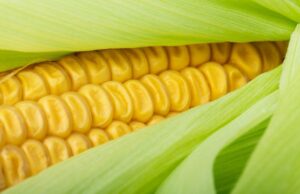
Kernel Agro Holding has completed the 2023 harvest and achieved a record corn yield of 10.2 tons per hectare, up 15% year-on-year, amid exceptionally favorable weather conditions during the season.
According to the company’s report for the first quarter of fiscal year 2024 (FY, July-October 2023), sunflower yield increased by 11% year-on-year to 2.8 tons per hectare, and soybean yield – 2.9 tons per hectare.
“Unlike last year, there were no serious disruptions during the 2023 harvesting campaign due to the war in Ukraine or other factors,” the document says.
According to the document, Kernel has completed sowing winter crops for the 2024 harvest, allocating 93 thousand hectares for winter wheat and 14 thousand hectares for rapeseed, while last year winter wheat plantings were significantly lower – 60.4 thousand hectares, or 17% of the sown area, and the area under rapeseed was reported as “insignificant”.
The document specifies that due to the reduction of corn area by 44% to 84.4 thou hectares, the harvest decreased by 35% to 861 thou tons, while the increase of corn area by 75% to 61.1 thou hectares with the growth of yield by 44% to 6.7 t/ha allowed to harvest 2.5 times more – 406 thou tons.
As for oilseeds, the soybean harvest exceeded last year’s by 10 times, amounting to 188 thsd tonnes, thanks to the same expansion of the area while maintaining yields. Sunflower was harvested in the amount of 335 thou tons, which, due to the increase in yield, allowed the company to exceed the previous year’s figure by 1% while maintaining the area by 8% – up to 119.7 thou hectares.
The area under other crops this year was reduced by 32% to 28.4 thousand hectares, according to the report.
“Kernel also reported that during the three months ended September 30, 2023, it sold one of its elevators in Kharkiv region: with a net asset value of $175 thousand, the cash consideration received amounted to $1.067 million.
It is noted that in December 2023, Kernel launched the group’s fifth cogeneration thermal power plant at the Prydniprovskyi oil extraction plant with an installed capacity of 21 MW.
The company confirmed that it plans to commission a new state-of-the-art extraction plant in Khmelnytsky region in spring 2024 with a capacity of 1 million tons of sunflower seeds per year, making it the largest in Ukraine.
The report specifies that since the beginning of the war, 1502 employees of the agricultural holding have been mobilized to serve in the Armed Forces of Ukraine or joined territorial defense units, of which 648 have been demobilized and returned to work, 39 employees were killed and 87 others were injured.
As reported, in the first quarter of FY2024, Kernel posted a net loss of $30.9 million, while the previous year ended with a net profit of $162 million, with revenue down 17% to $564 million.
According to the report, the book value per share for the year decreased from $20.7 to $6 (or PLN26.22), in particular due to the increase in the number of shares from 77.429 million to 147.864 million.
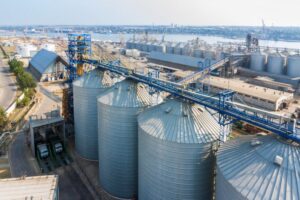
Kernel, one of Ukraine’s largest agricultural holdings, posted a net loss of $30.9 million in the first quarter of fiscal year 2024 (FY, July 2023-June 2024), while the company ended the previous year with a net loss of $162 million.
“The net loss … amounted to $31 million, which was the second quarter in a row in which the company reported a negative net result (the net loss of the fourth quarter of FY2023 was $138 million – IF-U),” the company said in a report on the Warsaw Stock Exchange.
Kernel’s consolidated revenues in the first quarter of 2024FY decreased by 17% compared to the first quarter and by 26% compared to the fourth quarter of 2023FY, amounting to $564 million.
“The main factors that contributed to this decline were a decrease in grain exports and the impact of lower prices for all commodities,” the document explains.
It is indicated that the change in the fair value of biological assets resulted in a $10 million loss in the first quarter of 2024 compared to a $2 million loss in the first quarter of 2023, lower prices led to a $23 million write-down of inventories, and net losses from impairment of financial assets amounted to $20 million, mainly reflecting provisions recognized for receivables.
In addition, it is specified that shipping and handling costs accounted for 22% of cost of sales in the first quarter of FY2024, and as a result of all of the above, gross profit in the first quarter of FY2024 fell by 70% year-on-year to $52 million, but this is better than the loss of $22 million in the fourth quarter of FY2023.
According to the report, general and administrative expenses in the first quarter of FY2024 fell by 29% year-on-year to $31 million, mainly due to lower wages and salary-related expenses.
Kernel’s EBITDA in July-September 2023 fell almost ninefold compared to July-September 2022, from $168 million to $19 million.
“The Oilseeds Processing segment remained the driver of the group’s profitability, contributing $58 million to Kernel’s profit. EBITDA increased by 15% compared to the fourth quarter of FY2023. These results reflect strong sales during the reporting period and a consistently high EBITDA margin of $158 per tonne of vegetable oil sold,” the report says.
“Kernel explained that it benefited from established export routes outside of Ukraine’s Black Sea ports, which allowed it to maintain high export volumes despite the blockade of the Black Sea. In addition, the weak profitability of sunflower processing, which prevailed in the summer of 2023, improved significantly in September with the arrival of a new sunflower crop on the market.
It is indicated that in the conditions of inaccessibility of the Black Sea for the group’s exports, the EBITDA of the Infrastructure and Trade segment amounted to only $6 million: Avere’s profitable trading operations slightly covered the loss of infrastructure and logistics assets in Ukraine.
The Agriculture segment generated a $23 million EBITDA loss in the first quarter of fiscal 2024.
According to the report, net cash used in investing activities amounted to $68 million in July-September 2023. It is specified that within the framework of investment activities, the group used $47 million to purchase property, plant and equipment (including the acquisition of a vegetable oil transshipment terminal in the port of Chernomorsk for $19 million), made an advance payment of $25 million for the acquisition of a vegetable oil transshipment terminal in the port of Reni, received $91 million from the sale of subsidiaries (mainly due to the final payment of remuneration for the removal of the director of Kernel), received $91 million.
Prior to the war, Kernel was the world’s largest producer of sunflower oil (about 7% of global production) and a major exporter (about 12%). It is one of the largest producers and sellers of bottled oil in Ukraine. In addition, it is engaged in the cultivation and sale of agricultural products.
Kernel’s net profit for FY2023 amounted to $299 million, while the company ended the previous year with a net loss of $41 million. The agricultural holding’s revenue for FY2023 decreased by 35% to $3.455 billion, but EBITDA increased 2.5 times to $544 million.
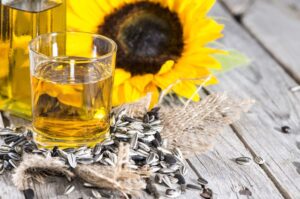
“Kernel, one of the largest Ukrainian agro-industrial groups, processed 610 thousand tons of sunflower and rapeseed at its oil extraction plants in the first quarter of the 2023/24 fiscal year (FY, July 2023 – June 2024), down 5% year-on-year.
“Due to the seasonal shortage of sunflower seeds at the end of the processing season (the new harvest will be in September-October 2023), the Group switched to rapeseed processing at two of its plants, processing 112 thousand tons for the three months ended September 30, 2023,” the company said in its financial report posted on its website over the weekend.
According to the report, the volume of edible oil sales in the first quarter of 2023/24 FY increased by 16% compared to the previous quarter and amounted to 369 thsd tonnes, including 20 thsd tonnes of bottled sunflower oil and 19 thsd tonnes of rapeseed oil.
In addition, the increase in yields and the increase in acreage under wheat, sunflower and soybeans harvested by Kernel’s agricultural enterprises, according to the data for the 1st quarter of 2023/24 fiscal year, led to an increase in the volumes received for storage at the group’s elevators to 1.208 million tons, which is 2.3 times more than a year earlier.
The agroholding noted that due to the termination of the Black Sea Grain Initiative on July 18, 2023, the throughput capacity of Kernel’s export terminals in Ukraine decreased significantly to 162 thsd tonnes in the first quarter of 2023/24, which is 83% less than in the previous quarter. Half of the exported agri-goods were shipped through Kernel’s infrastructure facilities in the port of Reni on the Danube.
Ukraine exported 203 thsd tonnes of grain in the first quarter of 2023/24, down 68% quarter-on-quarter. Most of the grain was exported via Ukrainian ports on the Danube and by rail to the Romanian port of Constanta, as Kernel’s usual export routes – Ukrainian Black Sea ports – were unavailable for export operations due to Russia’s unilateral termination of the Black Sea Grain Initiative in July 2023, the financial report says.
According to the agroholding, alternative export channels for Ukrainian agricultural products lead to high logistics costs, which, against the backdrop of low global grain prices, lead to a reduction in exports.
In this regard, Kernel has made significant changes to the structure of crops grown to minimize the area under the most energy-intensive and logistically complex crops (grains and corn) in favor of less energy-intensive soybeans and wheat.
As of September 30, the agronomic division completed the harvest of wheat, sunflower and soybeans on 61 thou hectares, 119.8 thou hectares and 65 thou hectares, respectively. The yields of all crops were better than expected due to favorable weather conditions and amounted to 6.7 t/ha of wheat, 2.9 t/ha of sunflower, and 2.9 t/ha of soybeans.
Corn harvesting from 84.4 thou hectares is still ongoing. Approximately half of the area has not yet been harvested. As a result of the harvesting campaign, Kernel expects to achieve a corn yield of 9.5 tons per hectare.
Prior to the war, Kernel was the world’s largest producer of sunflower oil (about 7% of global production) and a major exporter (about 12%). It is one of the largest producers and sellers of bottled oil in Ukraine. It is also engaged in the cultivation and sale of agricultural products.
Kernel’s net profit for FY2023 amounted to $299 million, while the previous year it ended with a net loss of $41 million. The agricultural holding’s revenue for FY2023 decreased by 35% to $3.455 billion, but EBITDA increased 2.5 times to $544 million.
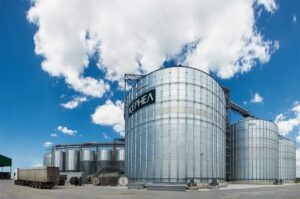
On Monday, shares of Kernel agricultural holding rose sharply on the Warsaw Stock Exchange (WSE) after almost a month of falling due to an additional share issue.
According to the WSE, as of 11:17 a.m. Kyiv time, their share price jumped by 20.74% to PLN7.66 ($1.76 at the current exchange rate), while after the announcement of the additional issue on August 22 and until Friday, September 15, it fell from PLN13.74 ($3.36) to a historic low of PLN6.34.
On Monday, a total of 203 deals were made with 40.08 thousand shares for almost PLN0.27 million.
Market participants speculated that the drop could have been caused by the need for index funds to sell shares, as Kernel’s shares were excluded from all indices after the additional issue and the drop in free float.
As reported, Namsen Limited, the majority shareholder and CEO of Kernel Agro Holding Andriy Verevsky, acquired 212 million 634,916 thousand shares during the additional placement among qualified investor shareholders for a total volume of 216 million shares. The purchase price was $0.2777 per share for a total value of $59.05 million, and the transaction was completed on September 1. The over-allotment shares will be kept in registered form and will not be admitted to trading on any stock exchange, Kernel said. Prior to the placement, 84 million 31.23 thousand shares were in circulation.
Earlier this year, Verevsky increased his stake from 41.3% to 74.05%, or 62 million 222.46 thousand shares, as part of the share buyback and the announced delisting of the agricultural holding from the Warsaw Stock Exchange: On May 12, he bought back 30 million 248,449 thousand shares at a price of PLN18.5 per share (approximately $4.47 at the then exchange rate), which brought the total buyout price to approximately $136.1 million, while the company’s IPO in 2007 was held at a price of PLN24.
Taking into account the dilution and the fact that another 7.86% of the shares were owned by the issuer itself, the total number of shares owned by Verevsky reached 274 million 857.38 thousand, which, taking into account treasury shares, gives him almost 93.7% of the votes.
The company is currently awaiting the Polish regulator’s verdict on its delisting application, which is opposed by a number of minority shareholders.
Prior to the war, Kernel was the world’s largest producer of sunflower oil (about 7% of global production) and a major exporter (about 12%). It is one of the largest producers and sellers of bottled oil in Ukraine. It is also engaged in the cultivation and sale of agricultural products.
Kernel’s net profit for the first nine months of FY2023 (July 2022 – March 2023) increased by 36% to $437 million, while revenue fell by 45% to $2.715 billion.
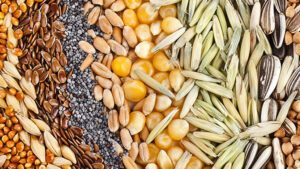
Kernel, one of the largest agricultural holdings in Ukraine, has almost completed harvesting winter wheat on an area of 60 thousand hectares and winter rapeseed on 10 thousand hectares, noting an increase in yields and forecasting an increase in production of all crops in the 2023 season, the company said in a statement on the Warsaw Stock Exchange.
According to the report, in the 2023 season, the agroholding expanded the area under winter wheat by 1.7 times, and winter rapeseed by twice compared to last year. Favorable weather conditions resulted in higher yields of these crops: winter wheat yields reached 6.6 t/ha, which is significantly higher than a year earlier, when it was 4.6 t/ha; winter rapeseed yields were 3.3 t/ha, compared to 2.5 t/ha a year earlier.
“Kernel has also allocated significant areas for spring crops, including 120 thou hectares of sunflower, 84 thou hectares of corn and 65 thou hectares of soybeans.
“Risks for the group’s spring crops (corn, sunflower and soybeans) are currently limited, so the group expects to get yields close to historical averages,” the agricultural holding said.
“Kernel assesses the harvest prospects in Ukraine as “generally favorable” and forecasts an increase in grain and oilseed production compared to the previous year.
Speaking about the prospects for sales of the grown products in FY2024, the baseline scenario of the agricultural holding envisages exports only through the Danube River ports and inland routes due to the susceptibility of agricultural infrastructure to destruction caused by Russia’s regular missile attacks.
“Kernel has already secured some capacity to export sunflower oil and meal, but has not yet secured a stable and cost-effective grain transshipment option. The agroholding announced the need for additional investments to increase grain export capacity and reduce logistics costs.
“At the beginning of the season, the profit forecast for FY2024 envisages a significant decrease in EBITDA due to the undermined productivity of the agriculture, infrastructure and trade segments, which is caused by relatively weak global grain prices and expensive export logistics,” the agricultural holding explained.
At the same time, Kernel expects the oilseeds processing segment to be the main source of profit for the group in fiscal 2024.
The agroholding reported that it does not have access to credit limits from banks and relies on accumulated cash. At the same time, it continues negotiations with various financial institutions to obtain CapEx loans.
Uncertainty over VAT refunds in the future and the possible risk of hryvnia devaluation also increase the agroholding’s exposure to foreign exchange losses.
“Any estimates of volumes and margins are very sensitive to the current operational situation in Ukraine due to the constant disruptions caused by the war. The holding’s work is aimed at reducing further risks of losses caused by possible future Russian attacks,” Kernel summarized.
Before the war, Kernel was the world’s leading producer of sunflower oil (about 7% of global production) and its exports (about 12%). The company is one of the largest producers and sellers of bottled oil in Ukraine. In addition, the agricultural holding is engaged in the cultivation and sale of agricultural products.
The largest co-owner of Kernel through Namsen Ltd. is Ukrainian businessman Andriy Verevsky, who this year increased his stake from 41.3% to 74.05% as part of the buyout and delisting of the company from the Warsaw Stock Exchange.
Kernel’s net profit for the first nine months of FY2023 (July 2022 – March 2023) increased by 36% to $437 million, while revenue fell by 45% to $2.715 billion.